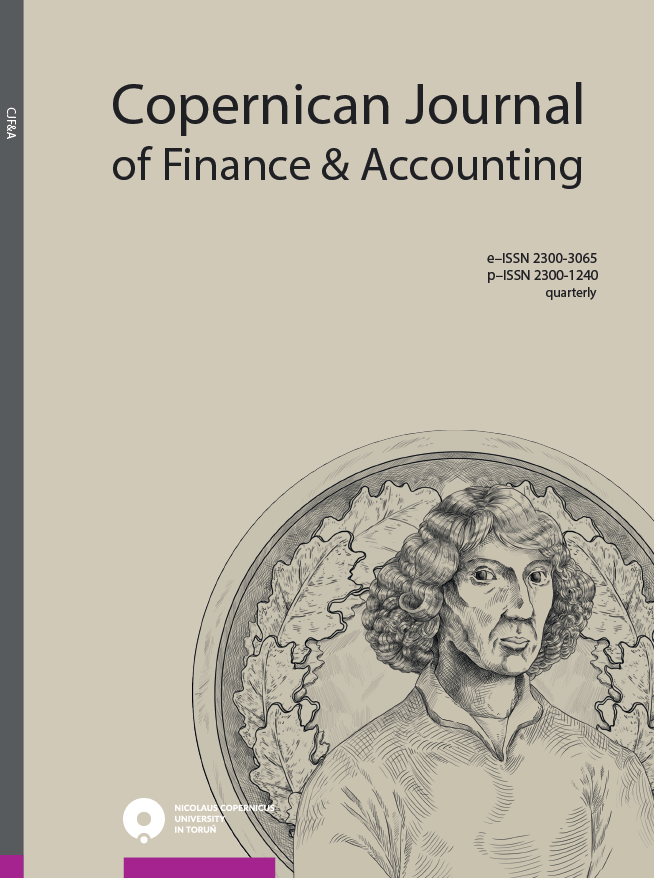Does Blockholders’ Concentration Influence Spending on Corporate Social Responsibility? – Evidence from the Indian Firms
DOI:
https://doi.org/10.12775/CJFA.2024.009Keywords
blockholder concentration, CSR spending, stakeholder salience, group firmsAbstract
This study investigates the relationship between blockholder concentrationand corporate social responsibility (CSR) spending in Indian firms, using stakeholderidentification and salience theory. This study aims to fill a gap in the literature byexamining how the concentration of blockholders, particularly external Blockholdersand promoters, influences CSR activities. The analysis covers 1,918 firms from 2014to 2023, using data from the Centre for Monitoring Indian Economy (CMIE) database. Empirical methods, including four regression models, are employed to examine the significanceof blockholder attributes on CSR spending. The results demonstrate the significantpositive impact of blockholder concentration on CSR activities. Specifically, theinfluence of external blockholders on CSR spending is greater than that of promoters. Furthermore, the study finds that single promoters with large investments are more inclinedtowards CSR spending, while interest in CSR diminishes when multiple promotershold significant shares. This study uniquely contributes to the literature by providingan insightful analysis of blockholder concentration’s impact on CSR, highlighting the differential effects between external blockholders and promoters, and underscoringthe importance of strategic blockholder alliances in enhancing CSR efforts. Thesefindings offer valuable insights for corporate managers and policymakers in emergingeconomies such as India.
References
Ali Shah, S.Z., Akbar, S., & Zhu, X. (2023). Mandatory CSR disclosure, institutional ownership, and firm value: Evidence from China. International Journal of Finance & Economics, 1-15. https://doi.org/10.1002/ijfe.2908.
Almeida, H.V., & Wolfenzon, D. (2006). A theory of pyramidal ownership and family business groups. Journal of Finance, 61(6), 2637–2680. https://doi.org/10.1111/j.1540-6261.2006.01001.x.
Baek, J.S., Kang, J.K., & Suh Park, K. (2004). Corporate governance and firm value: Evidence from the Korean financial crisis. Journal of Financial Economics, 71(2), 265–313. https://doi.org/10.1016/S0304-405X(03)00167-3.
Carroll, G.R., & Hannan, M.T. (1989). Density delay in the evolution of organizational populations: A model and five empirical tests. Administrative Science Quarterly, 34(3), 411–430. https://doi.org/10.2307/2393151.
Cheng, X., Wang, H., & Wang, X. (2022). Common institutional ownership and corporate social responsibility. Journal of Banking & Finance, 136, 106218. https://doi.org/10.1016/j.jbankfin.2021.106218.
Claessens, S., Djankov, S., & Lang, L.H.P. (2000). The separation of ownership and control in East Asian corporations. Journal of Financial Economics, 58(1–2), 81–112. https://doi.org/10.1016/S0304-405X(00)00067-2.
Desai, R., & Raval, A. (2022). Examining the relation between market value and CO2 emission: Study of Indian firms. Copernican Journal of Finance & Accounting, 11(3), 9-25. https://doi.org/10.12775/CJFA.2022.011.
Freeman, R.E., & David, L.R. (1983). Stockholders and Stakeholders: A New Perspective on Corporate Governance. California Management Review, 25(3), 88–106. https://doi.org/10.2307/41165018.
John, S.W. (2003). Corporate governance and firm profitability: Evidence from Korea before the economic crisis. Journal of Financial Economics, 68(2), 287–322. https://doi.org/10.1016/S0304-405X(03)00068–0.
Lamont, O. (1997). Cash flow and investment: Evidence from internal capital markets. Journal of Finance, 52(1), 83–109. https://doi.org/10.1111/j.1540-6261.1997.tb03809.x.
La Porta, R., Lopez-de-Silanes, F., & Shleifer, A. (1999). Corporate ownership around the world, Journal of Finance, 54(2), 471-517. https://doi.org/10.1111/0022-1082.00115.
Lee, W.J., & Choi, S.U. (2018). Effects of corporate life cycle on corporate social responsibility: Evidence from Korea. Sustainability, 10(10), 3794. https://doi.org/10.3390/su10103794.
Manogna, R.L., & Mishra, A.K. (2021). Does institutional ownership and internationalization affect corporate social responsibility in emerging economy firms? An empirical evidence from India. Journal of Asia Business Studies, 15(2), 345–358. https://doi.org/10.1108/JABS-12-2019-0361.
Miceikienė, A., Rimkuvienė, D., & Gesevičienė, K. (2020). Assessment of the environmental pollution determinants in the economy sectors of Lithuania. Copernican Journal of Finance & Accounting, 8(4), 171-184. https://doi.org/10.12775/CJFA.2019.023.
Mitton, T. (2002). A cross-firm analysis of the impact of corporate governance on the East Asian financial crisis. Journal of Financial Economics, 64(2), 215–241. https://doi.org/10.1016/S0304-405X(02)00076–4.
Nuvaid, V., Sardar, S., & Chakravarty, S. (2018). CSR as investment: An analysis of ownership structure and firm performance. Current Issues in Economics and Finance. Springer, 113–123. https://doi.org/10.1007/978-981-10-5810-3_8.
Ozdemir, O., Erkmen, E., & Han, W. (2023). EPU and financial performance in the hospitality and tourism industry: Moderating effect of CSR, institutional ownership and cash holding. Tourism Management, 98, 104769. https://doi.org/10.1016/j.tourman.2023.104769.
Panicker, V.S. (2017). Ownership and corporate social responsibility in Indian firms. Social Responsibility Journal, 13(4), 714–727. https://doi.org/10.1108/SRJ-02-2017-0030.
Salancik, G.R., Pfeffer, J., & Kelly, J.P. (1978). A Contingency Model of Influence in Organizational Decision-Making. Pacific Sociological Review, 21(2). https://doi.org/10.2307/1388862.
Savage, G.T., Nix, T.W., Whitehead, C.J., & Blair, J.D. (1991). Strategies for assessing and managing organizational stakeholders. Academy of Management Perspectives, 5(2), 61–75. https://doi.org/10.5465/ame.1991.4274682.
Scharfstein, D.S., & Stein, J.C. (2000). The dark side of internal capital markets: Divisional rent-seeking and inefficient investment. Journal of Finance, 55(6), 2537–2564. https://doi.org/10.1111/0022-1082.00299.
Shin, H.H.,& Stulz, R.M. (1998). Are internal capital markets efficient?. Quarterly Journal of Economics, 113(2), 530–552. https://doi.org/10.1162/003355398555676.
Tarighi, H., Appolloni, A., Shirzad, A., & Azad, A. (2021). Corporate Social Responsibility Disclosure (CSRD) and Financial Distressed Risk (FDR): Does Institutional Ownership Matter? Sustainability, 14(2), 742. https://doi.org/10.3390/su14020742.
Tokas, K., & Yadav, K. (2020). Foreign Ownership and Corporate Social Responsibility: The Case of an Emerging Market. Global Business Review, 24(6). https://doi.org/10.1177/0972150920920444.
Zhou, T., Liu, M., Zhang, X., Qi, Z., & Qin, N. (2024). Does institutional ownership affect corporate social responsibility? Evidence from China. Economic Analysis and Policy, 81, 84-98. https://doi.org/10.1016/j.eap.2023.11.017.
Downloads
Published
How to Cite
Issue
Section
License

This work is licensed under a Creative Commons Attribution-NoDerivatives 4.0 International License.
Stats
Number of views and downloads: 395
Number of citations: 0



